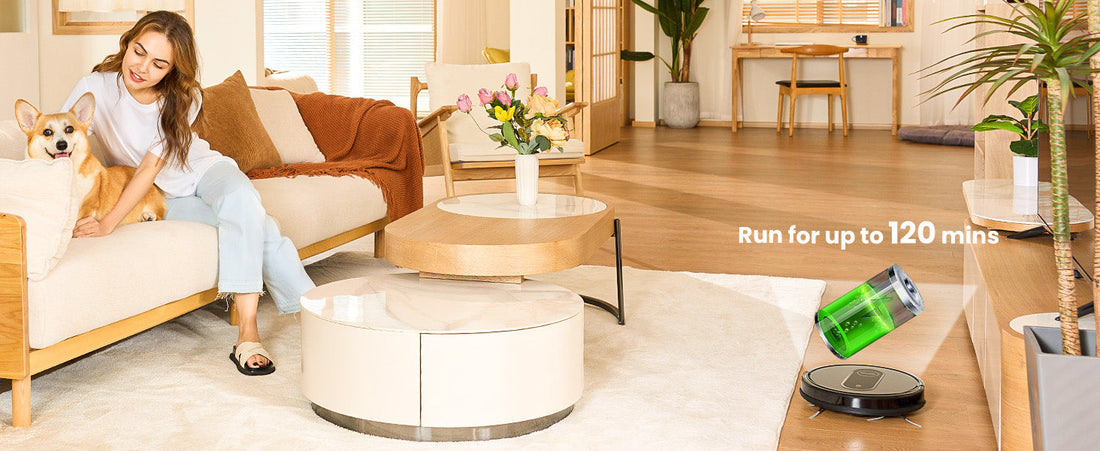5 Rookie Mistakes to Avoid When Buying Your First Robot Vacuum
So you've decided to join the robot vacuum revolution - welcome! There's nothing quite like watching a little automated helper clean your floors while you relax. But before you click "buy" on that shiny new robot, let's talk about the common pitfalls that trap many first-time buyers.
I've seen too many friends end up with robots that gather more dust than they collect because of these easily avoidable mistakes. Let's make sure your first robot vacuum experience is everything you dreamed it would be.
Mistake #1: Ignoring Your Home's Layout and Obstacles
The Reality Check
That gorgeous robot vacuum might look perfect in the commercials, but will it actually work in your home? Many beginners forget to consider:
-
Threshold heights between rooms (some robots can't handle even small bumps)
-
Furniture clearance (will it fit under your sofa and beds?)
-
Dark floors (some sensors struggle with very dark surfaces)
-
Clutter level (too many obstacles can confuse navigation)
The Solution
Before buying, grab a tape measure and:
-
Measure your furniture clearance heights
-
Check threshold heights between rooms
-
Note where cables and small objects typically live
-
Consider your floor types and colors
Mistake #2: Underestimating Maintenance Requirements
The "Set It and Forget It" Myth
Robot vacuums aren't magic - they need love too! Many beginners are surprised by:
-
Daily emptying of the dustbin (yes, even with small homes)
-
Weekly brush cleaning (hair wrap is the enemy)
-
Regular filter changes (typically every 2-3 months)
-
Sensor cleaning (dirty sensors mean poor navigation)
Realistic Expectations
A good rule of thumb: expect to spend 5-10 minutes per week on maintenance. If that sounds like too much, you might want to reconsider.
Mistake #3: Overpaying for Features You'll Never Use
The Feature Overload Trap
It's easy to get seduced by fancy features, but ask yourself:
-
Do you really need app control if you're home most of the time?
-
Will you actually use voice commands regularly?
-
Is mapping technology necessary for a small apartment?
-
Does mopping functionality actually work well, or is it just a gimmick?
Focus on What Matters
For most beginners, these features matter most:
-
Strong suction power (look for at least 2000Pa)
-
Good battery life (90+ minutes for average homes)
-
Reliable navigation (basic sensors are fine for simple spaces)
-
Easy maintenance (accessible brushes and filters)
Mistake #4: Assuming All Robots Handle Pet Hair Equally
The Pet Hair Reality
If you have pets, not just any robot will do. Many beginners discover too late that:
-
Non-motorized brushes can't handle pet hair
-
Small dustbins fill up too quickly
-
Weak suction leaves hair behind
-
Poor filtration spreads allergens around
Pet-Friendly Essentials
Look for:
-
Motorized brushroll (essential for pet hair)
-
Large dustbin capacity (0.5L+ for pet homes)
-
HEPA filtration (contains allergens)
-
Tangle-resistant brushes (saves maintenance time)
Mistake #5: Ignoring Noise Levels
The Surprise Factor
Many first-time buyers don't consider noise until it's too late. Remember:
-
60+ decibels can disrupt conversations
-
Loud robots can scare pets
-
Noisy cleaning might limit when you can run it
-
Quiet models (under 55dB) exist and are worth considering
Practical Considerations
Think about your household:
-
Do you have babies or light sleepers?
-
Are you often on calls or meetings at home?
-
Do your pets startle easily?
-
When do you typically want to run the vacuum?
Smart Shopping: What Beginners Should Really Look For
The Sweet Spot for First-Time Buyers
Based on helping countless new robot vacuum owners, I recommend prioritizing:
-
Reliability over fancy features
-
Ease of use over complex programming
-
Good customer support in case things go wrong
-
Reasonable price for your first experiment with robot cleaning
Why the Cleanova W9 Makes a Great First Robot
If you're looking for a beginner-friendly option that avoids these common pitfalls, the Cleanova W9 Robot Vacuum Cleaner (also known as Vexilar W9 in EU Market) is worth considering. It hits that sweet spot between performance and simplicity that works well for first-time owners.
With 360° laser navigation, it handles basic home layouts without overwhelming complexity. The 5000 Pa suction power is more than enough for most beginner needs, while the 50 dB quiet operation means it won't disturb your household. The 2-in-1 vacuuming and wiping functionality offers basic mopping capability without the complexity of dedicated mopping models.
What makes it particularly suitable for beginners is its balance of essential features without unnecessary complexity. You get app and voice control for modern convenience, but not so many features that it becomes overwhelming for first-time users.
Your First Robot Vacuum Success Plan
Before You Buy
-
Measure your space and note potential obstacles
-
Set a realistic budget based on your actual needs
-
Read reviews from other first-time buyers
-
Check return policies in case it doesn't work out
After Purchase
-
Start simple with basic cleaning schedules
-
Robot-proof your home by reducing clutter
-
Be patient during the initial learning period
-
Establish a maintenance routine from day one
Remember: your first robot vacuum doesn't need to be perfect - it needs to be good enough to show you how robot cleaning can fit into your life. You can always upgrade later once you understand what features actually matter to you.
The goal isn't to find the perfect robot on your first try. It's to find a robot that makes your life easier and helps you learn what you really want in your next model.

